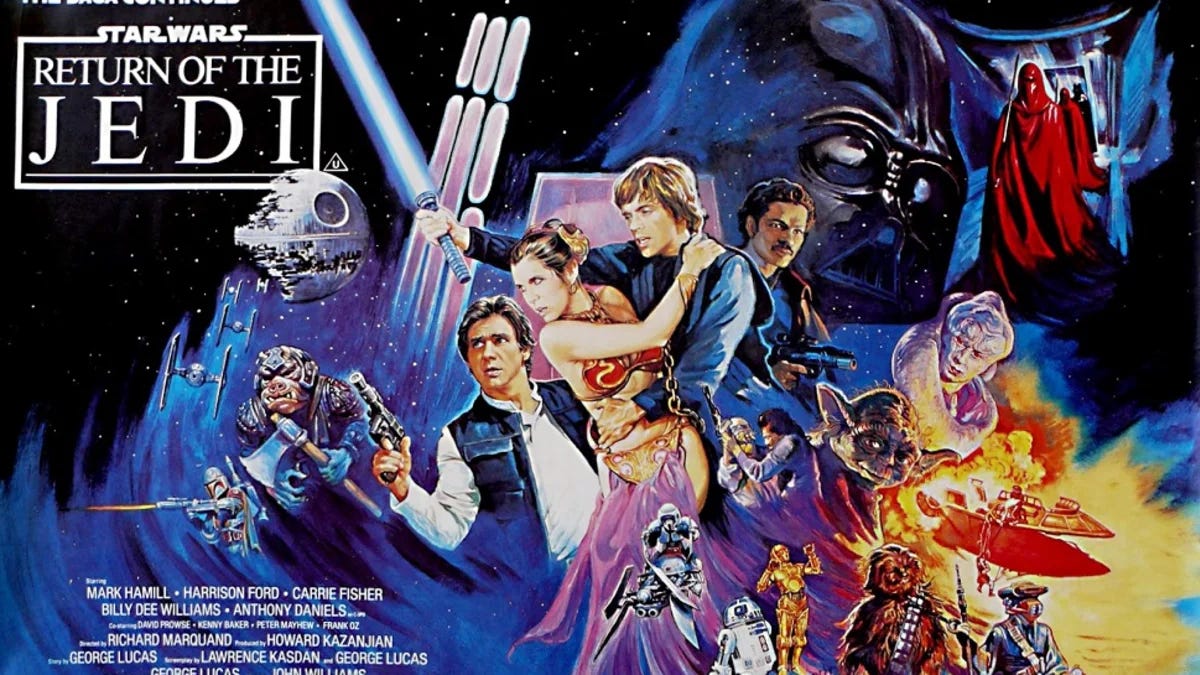Thirty Six Years Since Return of the Jedi
It's! Star! Wars! Again!

What is a third entry in a blockbuster franchise supposed to do?
Empire Strikes Back darkened and deepened Star Wars in important ways. It made it, in the long run of its reputation, indisputably better. It turned the franchise into a more tragic serial than its more populist predecessor. But is a big blockbuster movie even supposed to do this? These movies are supposed to be pop hits, right? Consumed in the moment?
A year after Empire Strikes Back, George Lucas’ producing effort Raiders of the Lost Ark was released. It didn’t make as much money as Empire, but how could it when it wasn’t a Star Wars sequel? What it did manage was to give everyone something they liked. Raiders played the hits. It satisfied the masses. It did so beautifully, but it was at its core a crowdpleaser in a way Empire wasn’t. And so we have Return of the Jedi.
From an opening act that seems to cram in every creature on Tatooine we didn’t see in the Cantina Bar to the Speeder Bike chase to once again blowing up the Death Star, Jedi is an abundance of treats from start to finish above all else. It’s Star Wars for the Reagan era, its qualities more than ever dictated by market forces and a desire to give the audience value for money. The year after Jedi’s release, the biggest films would be Beverly Hills Cop and Ghostbusters. Any doubts that Star Wars had ended the New Hollywood era had been blown out of the water. This was a film industry for the market, by the market. Any interest Lucas once had in an anti-corporate alternative to this was a distant memory by now. Star Wars had gone neoliberal.
This sounds harsh, because I really do like Jedi. Ditching the battle against the Empire for the first half-hour and change to rescue Han Solo from Jabba’s palace is a strange structural choice, but one can’t argue that it’s a good time, and feels exactly in place with the serials of the 30s and 40s that the franchise owes so much to. Its only real function is to undo the cliffhanger of Empire (which its fairly obvious they didn’t have a plan for when they wrote that movie, otherwise it’d be integral to the plot of this one) and show how Luke has become an accomplished Jedi. If this script had received studio notes, Lucas and Lawrence Kasdan would surely have been told to find a way to better tie this stuff into the “main” plot, but the events move at such a pace that you don’t question it too much upon first viewing.
Unfortunately the same cannot be said for what comes next. There’s various plot mechanisms and tying up of loose threads to get the core characters on Endor, and this is all fine. The script never really has a motivation for Luke joining the mission other than the narrative needs him to be there, and this is a real problem, but also one you’re unlikely to worry about until the third or fourth viewing. But let’s get to the elephant in the room. The Ewoks are, in and of themselves, not a huge issue. It’s a concern that Lucas chose a zoomorphic alien race as his stand in for the Viet Cong, as part of an egregious trend of his to conflate non-white cultures and peoples with aliens. They also speak to the further marketisation of Star Wars in having such an obviously toy-friendly species take up a large part of the film. But swapping them out for Wookies or anything else would not make the film significantly better. The structural problem here is how much the film slows down once they arrive. Like Jabba’s palace, they’re supposed to distract us from how little plot there is in the battle against the Empire, but this is significantly weaker material that feels like it could easily be excised.
If you’re wondering “why did she say she liked this film when she clearly has nothing but complaints about it?”, the answer is that the third act, especially everything with Luke, Vader and Palpatine in the Throne Room, is just awesome. In Lucas’ interpretation of the franchise, which starts with The Phantom Menace and ends with Jedi, Luke’s decision to resist the Dark Side and bring Anakin back to the light is really the emotional climax of everything, something that gains significant weight from the prequels. The extent to which this film structurally mirrors The Phantom Menace really emphasises that this story is coming full circle, and Lucas wants to make his final remarks. Menace, in that beautiful, poetic Lucasian dialogue, has Anakin state outright the very crude theme of the series: “the biggest problem in the universe is no one helps each other”. And finally, Anakin fulfils the prophecy to bring balance to the force by helping his son, and that’s Star Wars.
But much of this is meaning that Lucas centred later. In the long run (until Disney bought the franchise, and don’t worry, we’re getting to that next time), Jedi signified the conclusion, the final statement, the conceit of Star Wars. But in the moment? In the moment it was a popcorn movie, it was an exciting adventure, it was a bridge for Lucas’ cash flow problem following his divorce. It worked a lot better as the latter, with audiences really responding at the time while the long tail of its legacy saw it pushed into the “disappointing follow up to Empire” reputation. Since it’s no longer the conclusion to Star Wars, perhaps we should enjoy Jedi for the treats it contains. It certainly has plenty of them.

